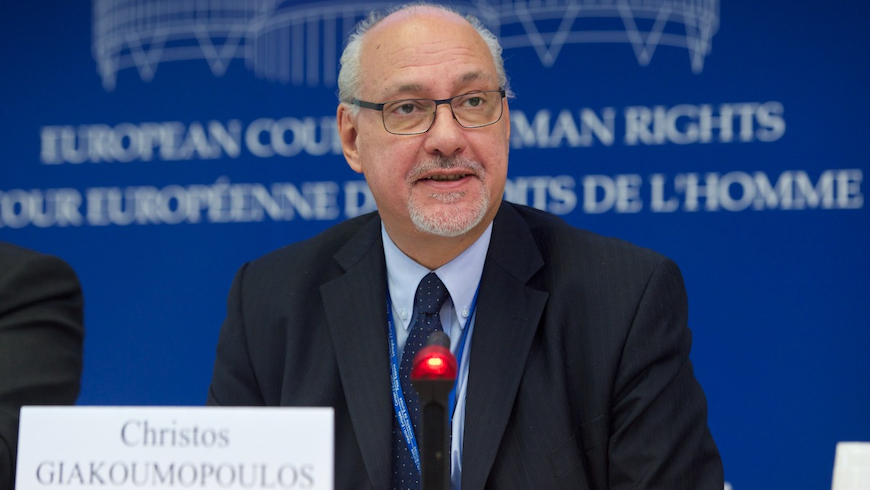Opening Address by Christos Giakoumopoulos
25th Council of Europe Conference of Directors of Prison and Probation Services (CDPPS)
9 November 2020, Strasbourg
Ladies and Gentlemen,
It is with great pleasure that I open the 25th Council of Europe Conference of Directors of Prison and Probation Services. As you know we had to relocate the whole event to Strasbourg but allow me to thank the Irish prison and probation services for their kind invitation to host the Conference in Dublin in June this year. Despite its postponement due to the COVID-19 pandemic and this hybrid format, I hope that your important Conference will succeed, as is always the case, in bringing together colleagues and professional friends from all over Europe. The sessions are being transmitted live on the internet, so we hope to reach out to as many persons as possible.
I would also like to thank warmly the speakers and moderators present in Strasbourg and those who have to present and moderate from a distance. Despite the distances between you, I am sure you will liaise with each other and with the participants and contribute to making this Conference a success.
2020 is not only a COVID-19 related year. It also bears a number of positive reasons to being together even remotely. It marks the 10th anniversary of the adoption of the Council of Europe Probation Rules and I welcome a major contributor to the drafting of these Rules, Professor Rob Canton who will deliver a keynote speech on the subject. I also welcome the other keynote speaker, Professor Dirk van Zyl Smit, whose role in drafting the 2006 European Prison Rules and in their revision in 2020 was pivotal.
And as you all know, the perseverant and high-quality monitoring work of the Committee for the Prevention of Torture since 1989 has been an important source and impetus for the reforms of the prison systems in our member States. I therefore have the pleasure to welcome its President, Mr Mykola Gnatovsky.
The COVID-19 crisis and its consequences on the work of the penitentiary and probation services - which is the topic of the today’s Conference - has considerably impacted the ordinary rhythm and manner of working in all countries and also at Council of Europe. It has also enhanced the development and use of new technologies, including artificial intelligence, and has helped us learn new working methods to maintain contact and cooperation between authorities and professionals.
Still, it is also vital to be able to network, to exchange information in a less formal manner, to socialise and meet colleagues. It is also important to “export” such Conferences to a host country in order to reach a larger number of professionals and audiences. Hence, we do hope we will be able to meet physically next year in September in Portugal following the kind invitation of their prison service and I would very much like to thank them for this.
The different bodies of the Council of Europe have continued their work during the past months and many of these bodies have issued statements or published toolkits related to COVID-19, starting with our Secretary General, Marija Pejčinović Burić, our Commissioner for Human Rights, Dunja Mijatović, the Committee for the Prevention of Torture and the Council for Penological Co-operation.
I would also like to inform you that on the occasion of the today’s Conference the SPACE team from the University of Lausanne will publish tomorrow a data survey “Prisons and Prisoners in Europe in Pandemic Times: An evaluation of the medium-term impact of the COVID-19 on prison populations” which analyses trends in European prison populations during the first nine months of 2020.
I would like to underline in this respect that the timely and well-organised manner in which the national prison services have introduced certain visiting restrictions and additional sanitary rules, in line also with our recommendations, has helped to prevent or contain the spread of the pandemic in penitentiary institutions. The probation services have also changed their manner of working with offenders under their supervision and all this is to be welcomed. What is needed now is to analyse and evaluate these experiences, and to reflect the lessons learned in the working methods and policies of both services.
I understand that you and your staff have faced numerous challenges in the past months and will probably face them for several more months. I would like to underline that it is very important to invest in good planning and a move towards the gradual lifting of the containment measures as soon as practicable. This would alleviate considerably the tension such a long confinement is certainly causing. It is also important because one of the major roles of your services is the resocialisation and rehabilitation of offenders which cannot be done without constant human contact and the work with offenders carried out by your qualified and dedicated staff. And offenders need to be in contact with their loved ones, with their lawyers, they need to prepare their release, their housing, employment prospects and so on.
You are here to agree on a roadmap and coordinate it with partner organisations to ensure efficiency and respect of human rights and the rule of law, which are the guiding principles of the Council of Europe. They should be preserved in all circumstances by the authorities of its member States at all levels.
I want to reassure you that the Council of Europe will continue to support its member States during the current pandemic and afterwards. All our bodies, structures and staff are mobilised and ready to use the existing tools and resources of our Organisation to share data, expertise and information among authorities, professionals and civil society organisations, in order to face current and future challenges.
I wish you a successful Conference!




